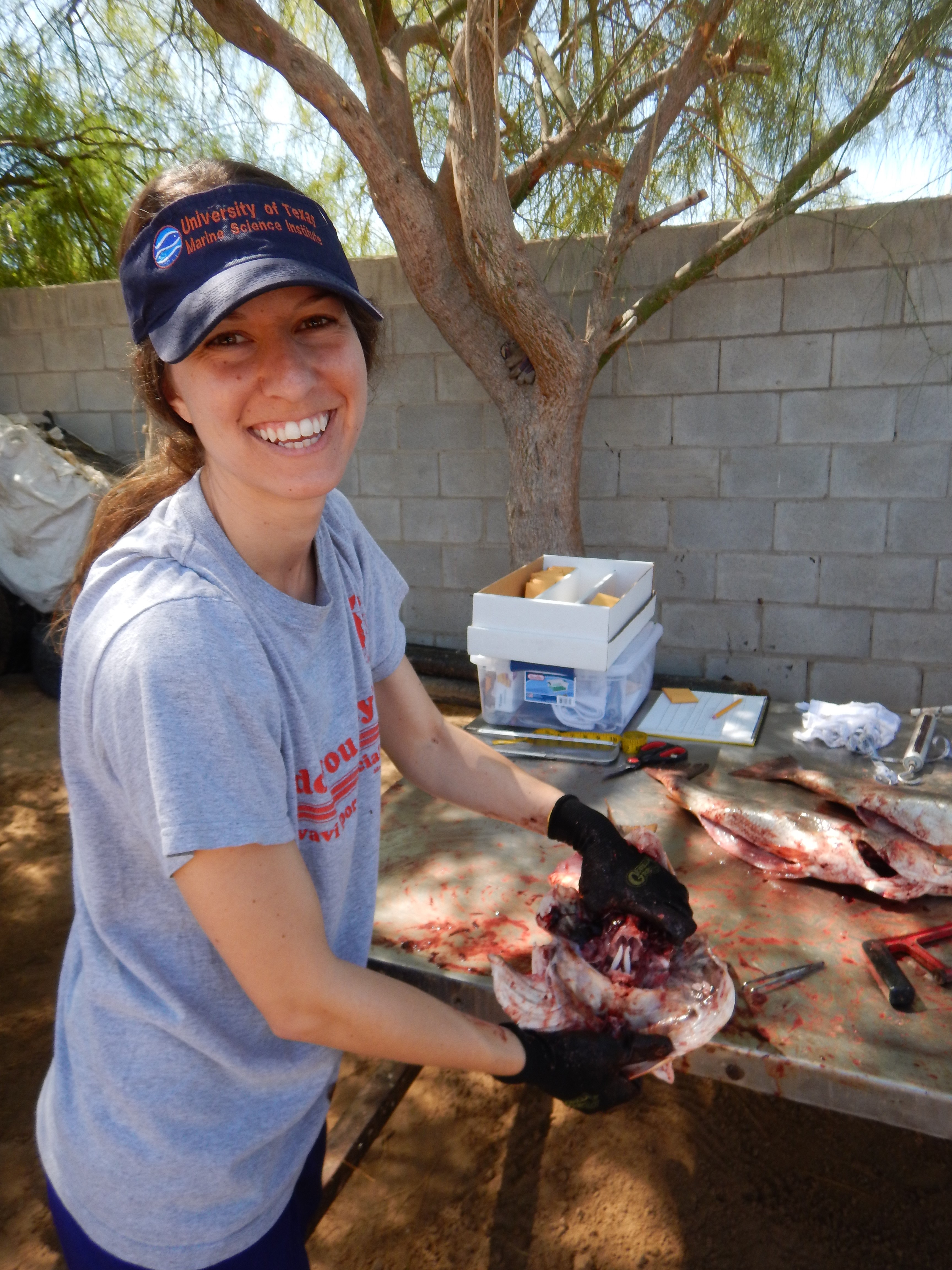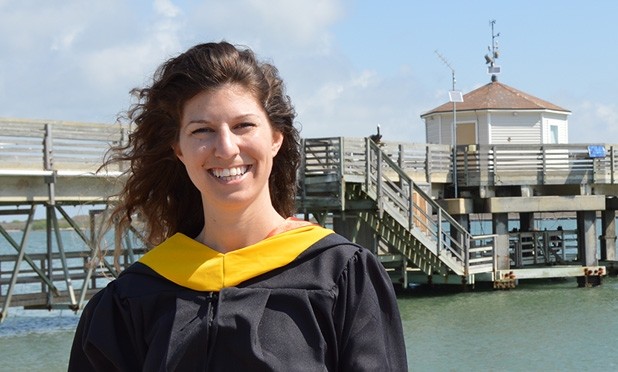Congratulations to our newest Master of Science, Erin Reed! We sat down with Erin recently to learn more about her research and how she hopes to create a long-lasting impact on fisheries science.
Faculty Supervisor: Dr. Brad Erisman
Research Area: Fisheries Ecology
Tell us about your research project.  During the 2016 field season, Erin pauses for a picture in between removing otoliths from a Gulf Corvina. Courtesy photo.My research focuses on two different scales of how the climate can impact both individual fish as well as the entire fishery. One aspect looks at how climate affects aspects of fish growth, such as how fast they grow or how large they get. The second aspect of my research determines how climate affects the overall production of the fishery. It’s important to understand how climate and the environment affect fish and fisheries because they aren’t currently incorporated into many fisheries management plans.
During the 2016 field season, Erin pauses for a picture in between removing otoliths from a Gulf Corvina. Courtesy photo.My research focuses on two different scales of how the climate can impact both individual fish as well as the entire fishery. One aspect looks at how climate affects aspects of fish growth, such as how fast they grow or how large they get. The second aspect of my research determines how climate affects the overall production of the fishery. It’s important to understand how climate and the environment affect fish and fisheries because they aren’t currently incorporated into many fisheries management plans.
My research uses the Gulf Corvina fishery as a model system. It is a small scale fishery in the Upper Gulf of California, Mexico. The goal of the work was to look deeper into interactions of climate on fish and their fisheries. More specifically short term climatic events such as El Niño events were our focus because they have a documented effect on the biological productivity in this region. Another perk to my research was to use a model system to create a methodological framework that may be used on other appropriate fisheries in the future. The Gulf Corvina was a good place to start as a model system because there is already lots of data that provides a great foundation. Which, enabled me to take research one step further to explore relationships of climate to fish, fisheries production and their population.
How did you decide you wanted to pursue marine science?
I have always really enjoyed science. I partially get it from mom. She’s a middle school science teacher with a degree in Biology. As an undergraduate student, I took a fish ecology course and it was the only thing I actually got excited about. That excitement evolved into trying to find a job in fish ecology. Then I got interested in fisheries research after volunteering and working at the National Oceanic and Atmospheric Administration, Southwest Fisheries Science Center in the Fisheries Resource Division.
 One of the rare teaching moments where Erin Reed, the neighborhood children, and our fellow scientists had the opportunity to explore the anatomy of a shark caught as bycatch in the gillnets used for the Gulf Corvina fishery. Courtesy photo.In 10 years, what would you like to have accomplished?
One of the rare teaching moments where Erin Reed, the neighborhood children, and our fellow scientists had the opportunity to explore the anatomy of a shark caught as bycatch in the gillnets used for the Gulf Corvina fishery. Courtesy photo.In 10 years, what would you like to have accomplished?
In ten years, ideally I would still be working in fisheries research. I would like to be a part of providing data to support effective fisheries management. I hope to contribute to the bigger picture and create a long-lasting impact on fisheries science.
What is the most interesting or surprising thing you’ve gotten to do for your research project?
I think everyone always says that fieldwork itself is highlight of research, but for me working alongside fisherman in a foreign country was really interesting. I was able to work directly with people who the science is structured to benefit. Working in a foreign country [Mexico] is also a very different experience. My Spanish isn’t so great and I had to work to move past communication barriers. I had the opportunity to collect and process fish right alongside fisherman as well as their families. One of the coolest and interesting things was working with the kids and even some of their parents. I used the little bits of Spanish that I knew to explain what was going on with my research. The kids and families already knew so much, and often times I would be the one who learned new things.
What has been the greatest reward of doing research?
I feel very lucky to have the opportunity to work on a project that I found very interesting. It was also rewarding to produce data that told a story. In fisheries research it is difficult to have predictability, but our project was able to produce data that indicated a level of predictability which we hope will be useful for resource managers in the future. It was really great to follow through with my research from idea to conclusion. As a technician in my previous job, you don’t get to do that because you’re primarily technical support.
What inspires you?
Honestly the view out my window really helps. If anything - what inspires me is the natural beauty that surrounds us. I enjoy working towards something that will actually help to sustain and preserve our natural resources for many years to come.
Why did you choose UTMSI?
I chose UTMSI because it was recommended to me by a mentor. I kind of stumbled upon it, but I was already interested in fisheries dynamics. UTMSI offered lots of opportunities and perks that I would have not gotten otherwise. Coming here has been the best move made in my career so far.
If you were a marine organism what would you be and why?
I’d be a whale shark. They’re really cool and I admire their prehistoric disposition. They’re big, gentle creatures who seem like they get to be mellow and eat their way through life - which sounds pretty great to me.
Erin Reed graduated this spring with a master of science. She has a bachelor of science in biology with emphasis in marine biology from San Diego State University. Erin is from San Diego, California. Erin has recently accepted a job offer for a permanent position in Oahu, Hawaii with JIMAR (Joint Institute of Marine and Atmospheric Research) based with the NOAA Pacific Islands Fisheries Science Center. Her new research will entail working on the life history of coral reef fishes for future stock assessments.









